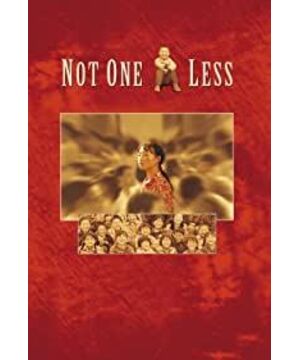A few years ago, a movie called "No One Less" touched countless Chinese people. That day, I searched it again, and sat in the dark home. I suddenly discovered that in this film about education, the director Zhang Yimou was actually telling a story about money.
Wei Minzhi first chased and shouted to the village head. What she wanted was the substitute tuition fee of 50 yuan. Later, she blocked a student from going to the county sports school for training. What she was worried about was that one less student would not get 50 yuan. Qian, after that, she went to the county town to find Zhang Huike, but she was afraid that the 50 yuan won.
Teacher Gao couldn't even hold the chalk with his fingers and couldn't bear to throw it away. Instead, he stuck it with his nails and continued to write on the blackboard; more than 20 students who had never seen Coca-Cola took turns drinking a can of "very expensive" Coke...
If you have 50 yuan, then you have 50 yuan, 50 yuan, many, many 50 yuan, if you have one, two, many, many pieces of chalk, if you have one can, two cans, many, many cans Coca-Cola, maybe the embarrassment of Wei Minzhi and her students is gone. Of course, at that time, Zhang Yimou's warmth and a touch of sadness might have disappeared.
However, in real life, would you like that deep sorrow or mediocre abundance? Arranging Qiwen big money on top of the wine cabinet gave Kong Yiji a momentary pleasure. Every one of us can experience this pleasure, but we don't want to say it.
On the day of Li Ka-shing's 70th birthday, a guest asked him: What is your biggest wish in life? Li Ka-shing whispered to the guests: Open a small restaurant, busy all day, at night after closing, and his wife hid in the bed and counted the money.
The guests laughed, and Li Ka-shing also laughed. The laughter is twofold, and the "misreading" in the middle seems to be difficult to completely bridge. Last year, Jack Ma's company went public in the United States. He seemed to have said something similar, but in fact, few people understand it.
People who have never enjoyed money cannot truly appreciate the beauty and evil of money.
If Cao Xueqin is not a poor son, where will he look for the luxurious and majestic Grand View Garden? If Zhang Dai has not experienced a period of absurd and unruly youth, does his "Dream of the West Lake" still have that unforgettable sigh?
"The more full the money bag is, the emptier the soul", obviously exuding a sour contrived air.
What money is lost is nothing more than what he didn't really own; and what money is possessed by people is the calmness and heaviness that people are not born with. Money can make profound people more profound, and shallow people more shallow. Money can change a person's life. Similarly, people can also change the color of money.
People who treat money as their opponent and enemy will worry about money all their lives, and those who treat money as friends will get the joy and peace of money. To be a slave to money, or to treat money as a slave, cannot sit on the same level with money.
There is an old song like this: I want to go to Guilin, I want to go to Guilin, but when I have time, I have no money, and when I have money, I have no time.
However, such lyrics are actually incomplete. Money can be exchanged for comfort, health care, and services, so that it is also indirectly exchanged for time. A reporter asked the French female designer Chanel about money. Chanel said: "The independence it gives me is very valuable."
Whether money can be exchanged for love, I have no absolute certainty. However, money can at least enable all lovers in the world to live a peaceful life with food and bed. From ancient times to the present, at least half of all the love tragedies we have witnessed in the heavens and on earth have been cracked by the embarrassment of money.
As for thinking, it seems that it has nothing to do with money, but what does thinking without money look like? When I was very young, my family had a thread-bound book of "The Analects of Confucius", one of which had influenced Chinese literati for thousands of years: "One can eat, one can drink. People cannot bear their worries, and even return (Yan Hui) Change one's joy." An
poor and happy said , literati sentiment. But it is said that the arrogant Yan Hui who loves to ask questions starved to death in the end.
Is there any necessary connection between Yan Huizhile and poverty? If you have money, doesn't Yan Hui need not "worry" but only "joy", right?
The hungry thinker can only think about his own stomach in the end.
Money is used to earn, and at the same time, money is also used to pay.
As a person’s money gets more and more, the happiness he gets in getting—whether it is psychological or physical, will gradually decrease and eventually return to zero, while the happiness and achievements obtained by giving The sense will become bigger and bigger. This is why in recent years, more and more entrepreneurs have devoted themselves to public undertakings such as charity and NGOs. The ethics of money is, in essence, a process of improving one's self-worth identity. The life of modern people is a process of competing with money, compromising and even coexisting on an equal footing, and finally pleasing each other.
In this sense, one's attitude towards money is actually a projection of one's attitude towards life and life. In all human stories, it is not money that leads people to destruction, but his own deeds. The role of money in human tragedies has never been active, but passive.
View more about Not One Less reviews








